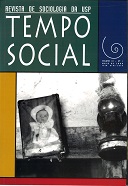Gilberto Freyre e a singularidade cultural brasileira
DOI:
https://doi.org/10.1590/S0103-20702000000100005Palavras-chave:
cultura brasileira, cultura ocidental, iberismo, macrossociologia, Gilberto FreyreResumo
O texto procura enfatizar o conteúdo macrossociológico da obra dos anos trinta de Gilberto Freyre. Ao invés dos temas classicamente vinculados à obra de Gilberto Freyre, como a mestiçagem e a história da vida privada, o ponto principal da argumentação é reconstruir o embate entre valores ocidentais da Europa já burguesa, que tomam o país de assalto a partir de 1808, e os valores tradicionais que Freyre chama de orientais para se referir ao conjunto de valores africanos, portugueses e rurais da vida colonial brasileira. Gilberto Freyre desenvolve em Sobrados e mucambos uma historiografia da institucionalização desses novos valores ocidentalizantes que se contrapõe, com vantagens, à versão dominante do Brasil como ainda dominado por valores pessoais e semi-tradicionais.
Downloads
Referências
ANDREWS, George Reid. (1991) Blacks and whites in São Paulo 1888-1988. Madison, University of Wisconsin Press.
ARAÚJO, Ricardo Benzaquen. (1993) Guerra e paz: Casa-grande e senzala e a obra de Gilberto Freyre nos anos 30. Rio de Janeiro, Editora 34.
BELLAH, Robert. (1984) The broken covenant: american civil religion in time of trial. Chicago, University of Chicago Press.
BELLAH, Robert. (1991) Civil religion in America. In: (org.). Beyond belief: essays on religion in a post-traditionalist world. Berkeley, University of California Press.
COSTA, Sérgio. (no prelo) Complexity, racism and the democratization of social relations in Brazil. In: DALLMAYR, Fred & SOUZA, Jessé (orgs.). Democracy and multiculturalism: Brazilian variations. New York, Rowman and Littflefield.
DAMATTA, Roberto. (1981) Você sabe com quem está falando? In: Carnavais, malandros e heróis: para uma sociologia do dilema brasileiro. Rio de Janeiro, Zahar.
DEGLER, Carl. (1971) Neither black nor white: slavery and race relations in Brazil and United States. Madison, University of Wisconsin Press.
ELIAS, Norbert. (1976) Über den Prozeß de Zivilisation: Soziogenetische und Psychogenetische Untersuchungen. Volumes I e II. Frankfurt, Suhrkamp.
FREYRE, Gilberto. (1957) Casa-grande e senzala. Lisboa, Livros do Brasil.
FREYRE, Gilberto. (1969) Novo mundo nos trópicos. São Paulo, Nacional/EDUSP.
FREYRE, Gilberto. (1990) Sobrados e mucambos. Rio de Janeiro, Record.
FROMM, Erich. (1987) Studien über Authorität und Familie. Lüneburg, Dietrich zu Klampen.
GUIMARÃES, Antonio Sérgio Alfredo. (1999) Racismo e anti-racismo no Brasil. São Paulo, Editora 34.
HABERMAS, Jürgen (1975) Die Strukturwandel der Öffentlichkeit. Berlin, Luchterhand.
HONNETH, Axel. (1992) Kampf um Annerkenung. Frankfurt, Suhrkamp.
LIMA, Luiz Costa. (1989) O aguarrás do tempo. Rio de Janeiro, Rocco.
MARX, Anthony. (1997) Making race and nation: a comparison of the United States, South Africa, and Brazil. Cambridge, Cambridge University Press.
NEVES, Marcelo. (1994) Entre subintegração e sobreintegração: a cidadania inexistente. Dados, Rio de Janeiro, 37(2).
TANNEMBAUM, Frank. (1992) Slave and citizen. Boston, Beacon Press.
TAYLOR, Charles. (1998) As fontes do self. São Paulo, Loyola.
Downloads
Publicado
Edição
Seção
Licença
Copyright (c) 2015 Tempo Social

Este trabalho está licenciado sob uma licença Creative Commons Attribution-NonCommercial 4.0 International License.



